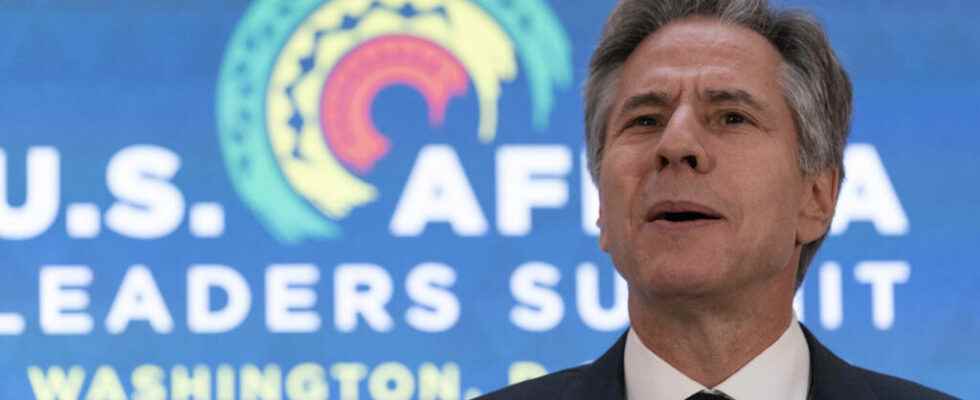The United States-Africa summit opens Tuesday, December 13 in Washington. The leaders of 49 African countries and the African Union are invited for three days in the American capital, to talk about security, economy, health or even climate change. This summit is being held at a time when a global geopolitical battle is being played out between Russia and Western countries. Africa is also at the heart of this battle. Interview with Paul-Simon Handy, Cameroonian researcher heading the Office of the Institute for Studies and Security (ISS) in Addis Ababa.
RFI: One can imagine that the United States will seek to consolidate, to strengthen its influence on the continent? Are we thinking particularly of military cooperation in the Sahel and in West Africa?
Paul Simon Handy: Yes, the holding of this summit, at this precise moment, even if it has been planned for a long time, is most certainly one more episode in the geopolitical confrontation that is happening between Western countries and Russia. But we must not forget that there is also a position, a desire to position itself by Western countries, and the United States in particular, vis-à-vis China, which has greatly expanded its commitment in Africa these last years. So, yes, Africa has become a geopolitical issue.
The French army has been pushed out of Mali, the situation is uncertain in Burkina, but it has retained strong links with Niger and the coastal countries. The United States are allies of France, to what extent can they play their own part, on the security level?
In August of this year, the United States issued a strategy for Africa. An innovative document in the sense that, for the first time, we see the United States projecting itself, defining strategic interests in Africa, developing a vision that goes beyond short-term stability interests, which were ultimately the creed of the United States, as of several Western countries, European in particular, in Africa. Short-term stability which led in particular to the duration of certain autocratic regimes in Africa with the consequences that we know today. So today they are trying to define their own strategic visions while remaining a strategic ally of France.
Could it go through new military partnerships?
Absolutely. Anyway, several African countries remain in demand. You saw, for example, in Ethiopia, how the lack of reaction from the United States pushed the Ethiopian government to forge other alliances. Then yes. The competition has widened today. The United States faces partners who do not hesitate to exploit any hesitation on the part of both the United States and Westerners in Africa.
Beyond the security aspect, there is of course the economy, with the US-Africa Business Forum which will take place in parallel with the political summit. Concretely, what can African countries expect? Investment promises?
Already, the United States should demonstrate that its desire to invest in Africa is not just a desire to thwart China in the huge infrastructure program that has given the African economy a huge boost in recent years. years. There, the United States will have to demonstrate that it is a question of doing more than thwarting China, but of wanting to invest in Africa in the areas that African countries consider strategic for their development.
And for that, there are concert projects, to be watched, which would allow the United States to demonstrate, as you suggest, their good faith?
The United States, like many Western countries, is at a sort of impasse, because on the one hand, Africa is above all rich in its raw materials, especially in fossil fuels, even if it is also a formidable reservoir of rare earth. But alongside that, there is the imperative to invest more and more in clean energies. So the United States is trying to stand out even already from its European partners by trying to promote in Africa a kind of mixing between fossil energy and renewable energy. European countries are much more militant in their desire to end the exploitation of fossil fuels and, on this side, the United States may have an advantage.
Aren’t there also expectations in terms of transfer of skills, transfer of technology?
If there is particular expectations from Africa, it is good at this level: technology transfer, transfer of skills. Given the crisis represented by accelerating climate change, there is consensus today on the fact that we must move to another economy, less energy-intensive, less voracious in fossil fuels. However, African countries have clearly expressed the need not to build the new economy on the same premises as today’s world economic order, in particular that African countries are pure producers in primary ways, without added value, and that Western countries are the ones that transform and industrialize it. So, for African countries, today, the expectation is yes, we are moving to this new economy, but on the condition that African countries too are producers of added value. This is an expectation expressed by most countries.
It will also be a question of development, climate change, food security, health… Many major subjects discussed during all the major events: on this United States/Africa summit, are there concrete expectations of African countries that will need to be monitored?
I don’t think there will be any particular concrete expectations. You know, summits are mostly great public relations moments. It is a question of sending a message as much to its public opinion for the United States as to African public opinion. This is also why, in addition to businessmen and women, there are also civil society organizations. There won’t be any big decisions, big contracts, but it’s about sending a message for the United States and for several African leaders a photo with the tenant of the White House, which still has symbolic value.
►Also listen: Calls on News – [Vos réactions] Opening of the Africa – United States summit
